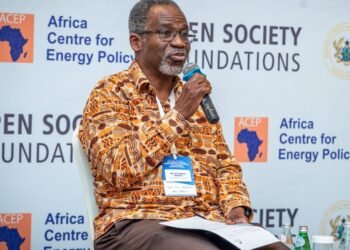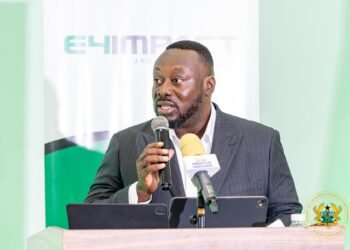President John Dramani Mahama, on his national “Thank You” tour, made a compelling address to the chiefs and people of the Greater Accra Region held at Dodowa.
The visit, marked by humility and a strong reaffirmation of the National Democratic Congress (NDC)’s campaign promises, saw the President extend heartfelt gratitude to the electorate while outlining major policy interventions to address decades-long concerns affecting the capital region.
Opening his address with greetings from Vice President Professor Naana Jane Opoku-Agyemang, he confirmed she’s recuperating and would soon return to the country to resume her official duties.
“It is with deep humility and heartfelt gratitude that I stand before you today here in Dodowa in the Greater Accra region as part of my national thank you tour.
“I’m here not just as the president of the Republic of Ghana but as a grateful servant of the people of Ghana to acknowledge and appreciate the immense support that you, the chiefs and people of this historic region, gave me and the National Democratic Congress in the 2024 general elections”
HE President John Dramani Mahama
He lauded traditional leaders for the warm receptions, spiritual support, and consistent role as custodians of peace and culture during challenging political times.
“Greater Accra, you believed in us. You stood for justice, equity, and for a reset of our dear nation, Ghana,” he affirmed, referencing his administration’s ongoing efforts to fulfil the 120-day post-election social contract promised during the campaign.
President Mahama proudly spotlighted the prominent roles sons and daughters of the Greater Accra Region now occupy in his administration.
He named key figures such as Dr. Valerie Sawyer (Senior Presidential Adviser), Hon. Samuel Nartey George (Minister for Communications, Digital Technology and Innovation), and Hon. Agnes Naa Momo Lartey (Minister for Gender, Children and Social Protection).
The President also acknowledged the presence of Hon.Rita Naa Odoley Sowah, the Deputy Minister for Local Government, chieftaincy and religious affairs and Hon Linda Ocloo, the Greater Accra Regional Minister.
President Mahama also mentioned several others across various agencies, including Mr Sylvester Mensah, the CEO of the Ghana Export-Import Bank (Ghana EximBank), Dr Ransford Anetey Abbey, CEO of Cocobod, Mr Julius Neequaye Kottey, CEO of DVLA, among several others.
These appointments, he said, underscore the government’s commitment to inclusive governance and equitable regional representation in shaping national policy.

Tackling Flooding and Urban Challenges
Among the most urgent concerns addressed was the perennial flooding in Accra, a crisis President Mahama said can no longer be tolerated.
He announced the formation of an interagency task force focused on implementing a comprehensive flood mitigation strategy. This includes the silting of major drains, re-engineering of waterways, and the relocation of structures in flood-prone areas.
President Mahama also criticised delays in the World Bank-funded Greater Accra Resilient Integrated Development Programme (GARID), urging residents to remain cautious during the peak rainy season. He pledged to integrate flood control into a broader climate resilience strategy that ensures lasting relief.
“While we await the completion of these projects, I call on all residents of Accra to avoid flooded drains during the rains and protect their valuable personal properties during the peak season of the rainy season in Accra, which starts from the end of this month till June”.
HE President John Dramani Mahama
A Clean Accra: Sanitation Takes Centre Stage
Addressing the issue of sanitation, President Mahama announced sweeping reforms. As part of a decentralisation initiative, he noted that 80% of the District Assembly Common Fund will now be allocated directly to Metropolitan, Municipal and District Assemblies (MMDAs).
According to the President, his Cabinet will soon deliberate on decentralising the sanitation budget, effectively making every district responsible for its sanitation outcomes, departing from the norm, where Zoomlion handles it.
To enhance accountability, he revealed that cleanliness would be used as a key performance indicator (KPI) for assessing the performance of MMDCEs, which could determine their continued tenure in office.
“And now that most of our DCEs have been nominated and confirmed, we’ll begin observing the National Sanitation Day program every month. This will be a revived monthly exercise involving all Ghanaians.
“This time, it will not be a symbolic event. It will be legally backed. It will be properly funded, and it will be operationalised through partnerships with local assemblies and private sector service providers.”
HE President John Dramani Mahama
The president reiterated that Accra, as the face of Ghana, must be “clean, green, and dignified.” He pledged strict enforcement of existing sanitation bylaws, particularly those mandating households to maintain clean frontages and drainage areas.

Bold Infrastructure Push
Turning to road infrastructure, President Mahama laid out an ambitious set of projects under the much-touted “ $10 billion Big Push” agenda. He acknowledged the deep frustrations caused by traffic congestion, poor maintenance, and incomplete road projects in the region.
Key roads earmarked for immediate attention include: the Tema Motorway and Tema Hospital Road, Apollonia to Oyibi Road, feeder roads in Ga East, Ga South, Ningo-Prampram, Shai Osudoku, Ada East, and Ada West. Others include the reconstruction of roads from Dawhenya to Afienya and Dodowa, and the Ashaiman to Madina Road.
Major expansions are also planned along the Liberation Road (from Airport to Christ the King), the Ring Road (from Kwame Nkrumah Interchange to La Beach Hotel), and the construction of the long-awaited Greater Accra Outer Ring Road.
This road, he explained, will allow transit traffic headed to the northern and western regions to bypass central Accra, reducing congestion drastically.
Ghana’s New City
In fulfilment of his manifesto promise, President Mahama also announced the beginning of feasibility studies for a new administrative city to decongest Accra permanently.
The proposed new city would be located in the Accra Plains, straddling parts of Greater Accra, Eastern, and Volta Regions, with planned expressways and railway links to the capital.
Chieftaincy Disputes and Land Justice
President Mahama addressed ongoing chieftaincy disputes, stressing their adverse impact on development.
While acknowledging the constitutional limitations on governmental interference, he urged traditional councils to utilise the National and Regional Houses of Chiefs to resolve issues amicably and with mutual respect.
He also waded into the contentious issue of state and ancestral Ga-Dangme lands. Highlighting rampant political land-grabbing during previous administrations, he revealed that he had instructed the Lands Commission to halt all transactions involving government and ancestral lands.

Some of these lands, he noted, were “sold to politically connected individuals for as little as GHS 45,000,” despite being worth millions of dollars.
“Distinguished elders, one issue that was repeatedly raised during my engagement with communities across this region was the matter of state lands and ancestral gangway lands. These concerns are valid. I understand the historical injustices and emotional death tied to this matter.”
HE President John Dramani Mahama
To address this historical injustice, the President proposed the formation of a Commission of Inquiry into the acquisition, allocation, and usage of public lands in Greater Accra.
The commission will include chiefs, legal experts, historians, and affected communities, with the aim of delivering a lasting, just solution.
Upgrading Health Infrastructure
On health, President Mahama committed to upgrading the Greater Accra Regional Hospital (Ridge) into a full teaching hospital, with phase two construction set to begin.
The hospital, he noted, will be affiliated with the Ghana College of Physicians and will help improve tertiary care in the region.
President Mahama also indicated that additional health infrastructure will be developed in underserved peri-urban areas such as Botianoh, Kpong, and Shai Osudoku, with emphasis on making primary healthcare more accessible.
He also pledged that all Community-based Health Planning and Services (CHPS) compounds—existing and new—will include accommodation for health workers.
Fixing Accra Street Lightening
Touching street light issues in the capital, President Mahama commended the Greater Accra Regional Minister’s recent efforts in improving the street lighting and public safety.
The President expressed his administration’s commitment to the expansion of the initiative and assured the full support of the central government.
“The government will soon start the distribution and installation of street lights in all districts of Greater Accra. This will be important to promote our twenty-four-hour economy policy”.
HE President John Dramani Mahama
On trade and commerce, President Mahama indicated that the Vice President, Naana Jana Opoku Agyemang, is leading a team that will select important markets across the country for improvement and reconstruction.

He assured the people of Dodowa that their market is likely to be featured in the number of market across the country that will see improvement.
President Mahama finally expressed his administration’s commitment to effective decentralisation, local governance, and inclusive development.
Here, he assured the traditional leaders of continuous greater engagements between the presidency and the traditional councils.
“I’ll personally ensure that the voices of Gadangme communities, our fisher folk, our market women, our youth leaders, and professionals in this region are always heard and respected”.
HE President John Dramani Mahama
President Mahama’s speech in Dodowa reflected not just appreciation but a bold reaffirmation of his administration’s commitment to transformative change in Ghana’s most densely populated region.
From infrastructure to environmental resilience, chieftaincy reform to inclusive governance, he left no doubt that the Greater Accra Region remains central to the national reset agenda.
“I stand before you not with empty words, but with plans already in motion, and a deep resolve to deliver,” he concluded, drawing applause from the crowd.
READ ALSO: Stakeholders Warn of Looming Risks to Ghana’s Cocoa Exports




















